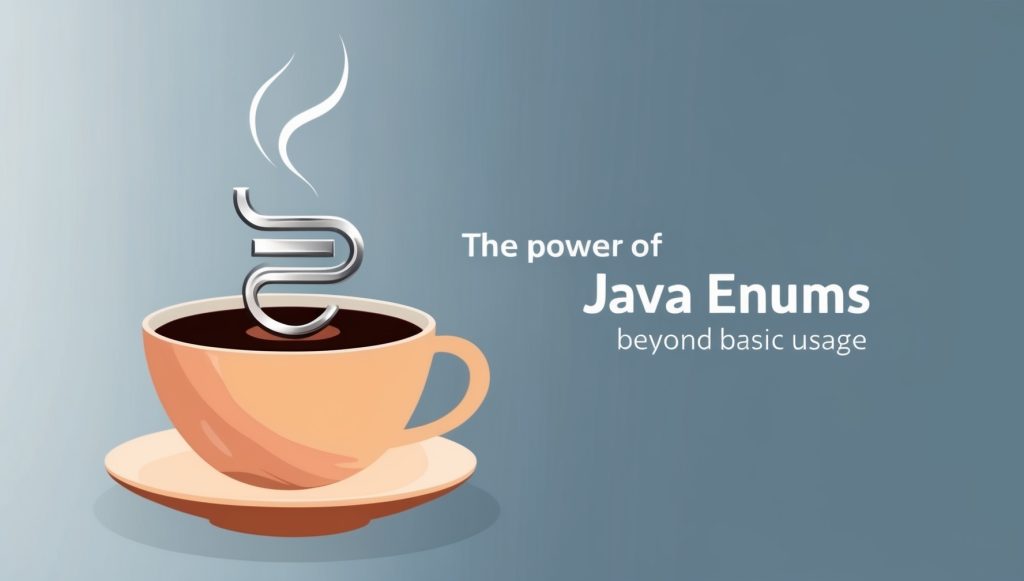
The Power of Java Enums – Beyond Basic Usage
Java Enums are often introduced as simple constants, but their true power lies in their extended capabilities. This blog explores the advanced features of Java Enums, their real-world applications, and best practices, aimed at helping developers leverage enums for more readable and maintainable code.
Introduction
Enums in Java are powerful constructs that go beyond basic constants. They allow developers to add fields, implement interfaces, encapsulate logic, and structure code in meaningful ways. This blog goes deeper into the features of Java Enums, highlighting practical usage and advanced techniques.
Basic Overview of Java Enums
Before delving into advanced features, let’s briefly cover the basics of Java Enums.
public enum Day {
MONDAY, TUESDAY, WEDNESDAY, THURSDAY, FRIDAY, SATURDAY, SUNDAY
}Enums are typesafe and restrict values to specific constants. They reduce errors and improve code readability, making them a powerful alternative to string-based or integer constants.
Advanced Enum Features
1. Enums with Fields and Methods
Enums can store additional data by defining fields, making them much more versatile than simple constants. Adding methods allows enums to encapsulate logic.
public enum Operation {
ADD("+") { public double apply(double x, double y) { return x + y; } },
SUBTRACT("-") { public double apply(double x, double y) { return x - y; } };
private final String symbol;
Operation(String symbol) { this.symbol = symbol; }
public abstract double apply(double x, double y);
public String getSymbol() { return symbol; }
}With this approach, each enum constant can represent a unique behavior, perfect for handling various operations or states.
2. Implementing Interfaces with Enums
Enums can implement interfaces, which enables polymorphic behavior.
interface Describable { String getDescription(); }
public enum Animal implements Describable {
DOG { public String getDescription() { return "Barks"; } },
CAT { public String getDescription() { return "Meows"; } }
}This technique is useful in scenarios requiring distinct behavior for each constant.
3. Enums with Constructors
Enums can define constructors to initialize constants with specific values, adding flexibility to handle associated data.
public enum Planet {
EARTH(5.97e24, 6.371e6), MARS(6.39e23, 3.3895e6);
private final double mass;
private final double radius;
Planet(double mass, double radius) { this.mass = mass; this.radius = radius; }
public double surfaceGravity() { return G * mass / (radius * radius); }
}Each constant can hold unique data, such as Earth’s and Mars’s mass and radius.
Using Enums in Practical Scenarios
1. Enums in Switch Statements
Enums pair naturally with switch statements, simplifying logic and improving readability.
public String getDayType(Day day) {
return switch(day) {
case SATURDAY, SUNDAY -> "Weekend";
default -> "Weekday";
};
}Using enums in switch statements makes conditions easy to read and reduces error-prone string comparisons.
2. Polymorphic Behavior with Enums
Enums support polymorphic behavior by allowing each constant to override methods.
public enum Role {
ADMIN { public String getPermissions() { return "Full Access"; } },
USER { public String getPermissions() { return "Limited Access"; } };
public abstract String getPermissions();
}This feature is valuable for defining behavior tailored to each constant, like permissions based on roles.
3. Using Enums in Design Patterns
Java Enums can be instrumental in design patterns, especially the Singleton, Strategy, and Factory patterns. Using an enum for the Singleton pattern is a common and effective way to ensure a single instance.
public enum Singleton {
INSTANCE;
public void doSomething() { /* functionality */ }
}Enums simplify singleton implementation and offer thread safety out-of-the-box.
Best Practices with Java Enums
Organize Code for Readability
When working with enums, grouping similar constants together keeps code maintainable. This makes enums especially suited for managing structured data like status codes.
Avoid Overuse of Enums
Using enums for unrelated constants or complex logic may lead to overcomplicated code. Enums should group only related data or behavior.
Enum Anti-patterns
A common anti-pattern is using enums as a replacement for classes in unrelated contexts. Enums work best when values represent a set of constant values with a meaningful relationship.
Case Study: Real-World Examples
Enums are highly practical for representing real-world states, such as order statuses, user roles, or transaction types.
Example: Error Codes
public enum ErrorCode {
NOT_FOUND(404), SERVER_ERROR(500);
private final int code;
ErrorCode(int code) { this.code = code; }
public int getCode() { return code; }
}Using enums for error codes allows for organized and centralized error handling.
Conclusion
Java Enums offer a lot more than just constants. They support fields, methods, constructors, interfaces, and can implement design patterns, adding immense value to Java applications. By exploring advanced features, developers can build organized, maintainable, and readable code structures.
This blog provides general guidance on advanced Java enum usage. For feedback, please reach out to help improve its accuracy.
Call-to-Action (CTA)
Discover the power of Java Enums in your projects! For more insights, explore Java’s official documentation or consider reading on design patterns to deepen your understanding of enums’ role in object-oriented programming.